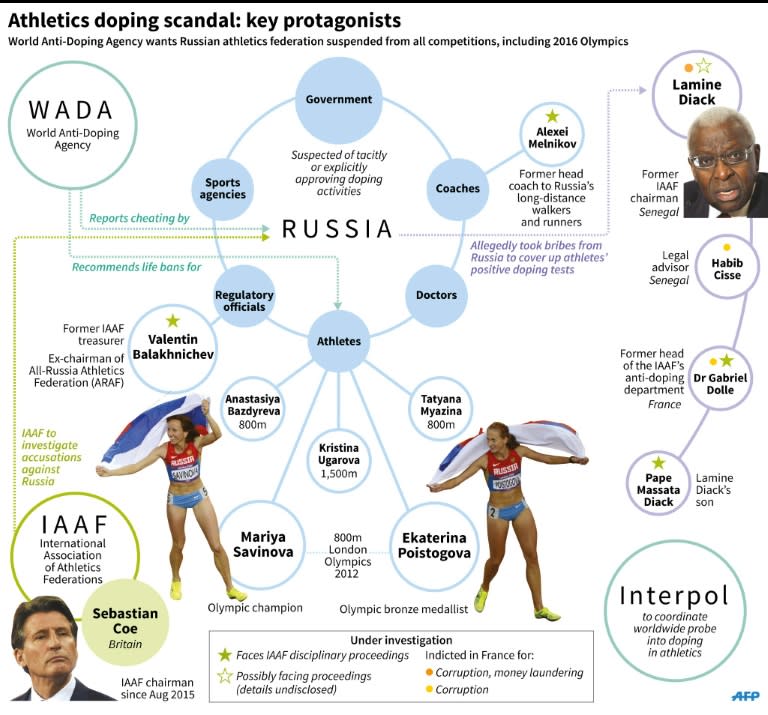IAAF orders life bans over Russia doping bribes
IAAF judges on Thursday banned for life former Russia athletics chief Valentin Balakhnichev and a son of former world body president Lamine Diack over the blackmailing of athletes who failed doping tests. The ethics commission also ordered a life ban against former Russian walking coach Alexei Melnikov and a five year suspension for former world body anti-doping doctor Gabriel Dolle. The panel found that the four "conspired to extort what were in substance bribes from the athlete by acts of blackmail." "Any lesser sanction would not meet the gravity of their offences," the commission added in announcing the bans. "The life bans announced today could not send a stronger message that those who attempt to corrupt or subvert the sport of athletics will be brought to justice," said International Association of Athletics Federations president Sebastian Coe. Papa Massata Diack, Balakhnichev and Melnikov also face fines of between $15,000-$25,000 (13,800-23,000 euros). Papa Massata Diack and his father Lamine Diack, who stepped down as IAAF president in August, and Balakhnichev are all under investigation by French police over hundreds of thousands of dollars paid to cover up doping offences. Lamine Diack is alleged to have received one million euros ($1.1 million) alone. His son acted as a marketing consultant to the IAAF until forced to stand down over the scandals. The IAAF ethics commission looked into charges that Russian runner Liliya Shobukhova, who won the 2012 London Olympics women's marathon, paid more than $600,000 to have her doping violations covered up so she could compete at the Olympics. Melnikov, former national long distance walkers coach, is said to have acted as an intermediary between athletes and Balakhnichev, who was also the IAAF treasurer, and Diack. Dolle, who like Diack and his father comes from Senegal, played a smaller role in the coverup. According to the testimony, some 300,000 euros ($325,000) was paid back to Shobukhova through a Singapore company Black Tidings in 2014 in a bid to obtain her silence over the bribes. But Shobukhova turned whistleblower for the World Anti-Doping Agency (WADA) which has been investigating widespread doping in Russian support. According to the IAAF report, Balakhnichev has given information that at least five other Russian athletes had given cash to cover up doping offences. Balakhnichev alleged that he had been "blackmailed" by the IAAF and that the system was orchestrated by the world body president's son and Habib Cisse, a former lawyer for the president. Russia has been suspended by the IAAF and now faces a race against time to be readmitted for the Rio de Janeiro Olympics in August. Balakhnichev said the ban was a "clearly politicised decision". "Certain forces are trying to increase the pressure on Russian sport by taking such a radical decision," he told Russia's state-run TASS news agency. Russia's Sports Minister Vitaly Mutko told the R-Sport agency however that the "decision was expected and there is no sense in appealing". Shobukhova is now serving a reduced ban for her doping failures. Her Olympic title has been stripped from her. At the peak of her career she was earning $1.5 million a year, the ethics commission report said. "The (2014) repayment was to be a quid pro quo for her acceptance of sanction," the IAAF report said. WADA is to release a new report on doping in athletics on January 14 which is expected to implicate new countries. Coe said that the IAAF was still helping the French criminal investigation and WADA's independent commission. The IAAF, which has faced accusations of taking a lax attitude to doping, said it was "angered" by the bribery case and insisted the four no longer have any link to the world body. "The IAAF is reassured that the panel of the ethics board has seen no evidence implicating any other members of the IAAF Anti-Doping Department," it said in a statement.



